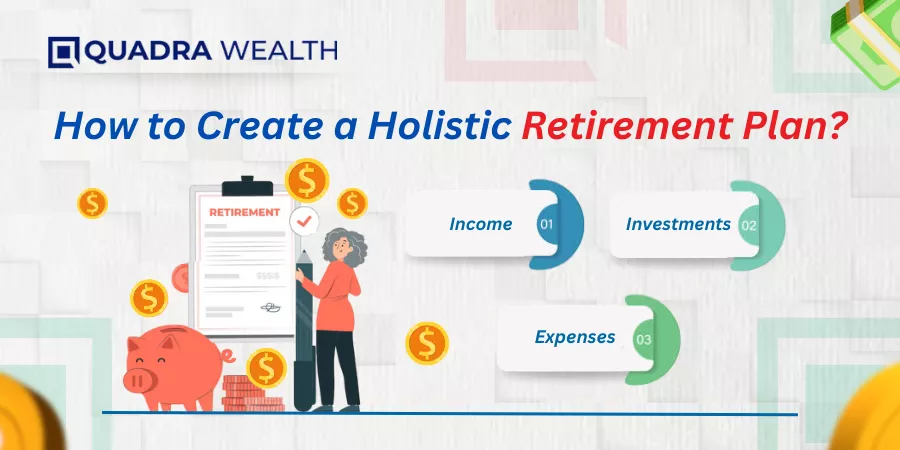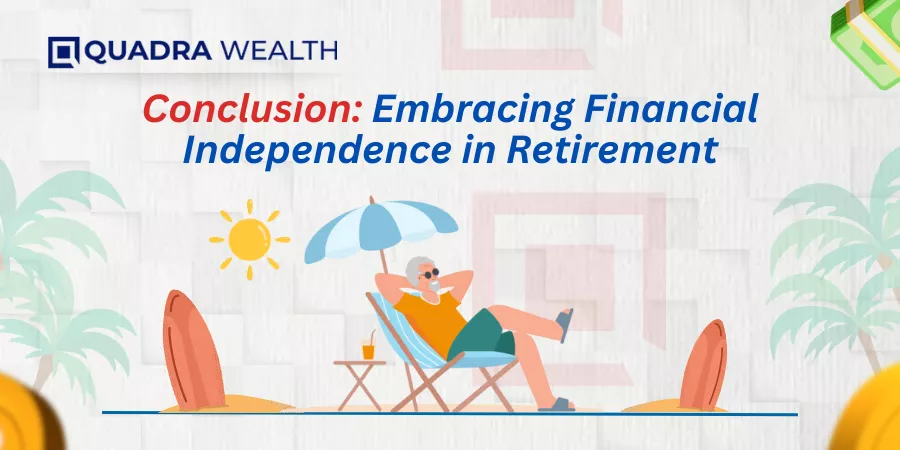Are you ready to learn about ‘What is Holistic Retirement Planning’ that not only focuses on saving money, but also your overall well-being? If so, consider joining the planning for retirement.
Holistic retirement planning for a fulfilling and secure future needs more than just saving money. A holistic approach to retirement management enables you to maximize your retirement savings.
In this article, we will dive deep into what is holistic retirement planning, and how the paradigm shift toward holistic retirement planning offers a more comprehensive and fulfilling retirement experience.
Let’s begin your holistic retirement journey.
Understanding What is Holistic Retirement Planning?
Traditionally, retirement planning has revolved around just financial aspects alone. The only focus was to gather ample fortune to maintain a comfortable lifestyle during the golden years. However, this limited approach fails to consider other crucial factors that lead to a fulfilling retirement.
In recent years, the paradigm shift toward holistic retirement planning considers that retirement is not just about saving money. It includes elements such as physical and mental well-being, pursuing passions and hobbies for peace of mind, social connections, and personal fulfillment.
By adopting a holistic mindset, you can achieve retirement goals and enjoy a more fulfilling post retirement life.
The Traditional Retirement Approach
For decades, the traditional approach to retirement planning has dominated the financial industry. It focuses on accumulating wealth, commonly a percentage of income, in retirement accounts such as 401(k) or IRAs.
While this approach makes retirees free of financial stress, it neglects other important aspects of retirement. It fails to address the importance of personal fulfillment, physical and mental health, and social connections in the later stages of life.
These retirement strategies ensure financial well-being but can result in emotional dissatisfaction.
The Paradigm Shift toward Holistic Retirement Planning
The shift toward holistic retirement planning goes beyond the limitations of traditional methods and promotes a more comprehensive approach. It acknowledges that financial planning alone does not fulfill the purpose of a meaningful life in retirement. Instead, it motivates many individuals to pursue a purpose-driven and well-balanced retirement.
A well-rounded retirement plan includes crucial aspects, such as healthcare costs, personal interests, relationships, and lifelong learning. It considers that retirement is an opportunity for self-discovery, personal growth, and making a positive impact on the world.
By shifting the focus from money to a more holistic mindset, individuals can embrace a retirement that aligns with their values and promotes emotional well-being.
Comprehensive Retirement Planning Strategies
To implement holistic retirement strategies, it is crucial to understand the key elements of this transformative approach.
Here’s an overview:
- Having a diversified vision of your stress-free retirement.
- Evaluating your financial situation.
- Adopting ongoing, comprehensive financial planning.
- Developing a retirement income strategy that addresses both your short-term and long-term needs.
- Selecting a comprehensive fee-based regular check-up for health and wellness .
How to Create a Holistic Retirement Plan?

Understanding what is holistic retirement planning leads to creating a holistic retirement plan. It’s important to note that holistic retirement planning is not a clearly outlined investment strategy with technical workflows. Likewise, there’s no one-size-fits-all strategy for a holistic retirement plan.
It’s better to consider holistic retirement planning as a proactive mindset, both for you and your financial planner. The objective is to align investments, savings, and obligations with big picture goals and needs.
For example, in tax planning, we hold the view that it’s not about what you earn but what you keep. Whether through reduced liability or increased income, wise decisions will help you keep more money in your pocket or savings accounts.
The same rule applies to holistic retirement planning. It’s about focusing on the broader perspective and then taking a closer look at the relevant specifics. The goal is to make a decision that plays a crucial role to meet your lifestyle goals.
In simpler terms, it’s important to plan for retirement, making choices that benefit your overall wellbeing. It includes all aspects of an ideal retirement planning. That means a holistic retirement strategy covers all the following areas, as well as any others relevant to your unique situation:
Income
It includes current income and income during retirement. It also involves everything from social security and pensions to investment income, and any consulting or other work done after retirement.
Investments
It’s essential to consider your personal risk tolerance when investing in any business. It’s also pivotal to plan for a notable withdrawal rate of about 4% annually from retirement accounts.
Expenses
From home upkeep and groceries to entertainment and travel, a holistic retirement strategy focuses on these financial wants and needs. More specifically, it encompasses:
- Taxes: You may have to pay taxes after retirement. They can pose a significant financial burden in retirement, depending on the type of investment accounts used and many other factors. Holistic retirement planning doesn’t overlook tax implications.
- Long-term Care: The Census Bureau states average life expectancy in the U.S. has increased in the long-term. It puts additional emphasis on planning for the expenses of potential long-term care requirements.
- Life Insurance:Insurance policy is an important source of both financial protection and a potentially significant expense. Ensuring the right life insurance coverage is a crucial part of the bigger picture.
- Medicare: Medicare is a significant advantage for many retirees. However, high earners may have to contribute more (the Income-Related Monthly Adjustment Amount IRMAA) to find coverage. Creating the best plan for your needs and reducing IRMAA are the main subjects in holistic retirement planning.
- Estate Planning: Effective estate planning backs your wishes for your assets and provides a solid financial foundation to your successors during a difficult time.
Conclusion: Embracing Financial Independence in Retirement

In short, the traditional approach to retirement planning is no longer sufficient in today’s dynamic world. Adopting the holistic retirement planning revolution enables individuals to ensure a retirement that is not only financially satisfying but also emotionally fulfilling and purpose-driven.
It’s crucial to integrate important aspects of life like health, medical costs, entertainment, personal interests, and social relationships, individuals can have a well-rounded retirement experience. Now is the time to move beyond the outdated view of retirement planning.
Start planning today for your ideal retirement. Feel free to consult a renowned financial advisor to know more about what is holistic retirement planning and how to achieve financial freedom in retirement.
FAQs
Q1. What Qualities Should a Holistic Retirement Planner Have?
A: At a minimum, a holistic retirement planner should recognize the complete picture of your retirement. It’s important to understand that they should take into account your unique personal situation when providing financial advice.
Q2. Why is a Retirement Plan So Important?
A: Individuals can create a retirement plan to maintain the same lifestyle they currently have after they retire. While you may spend your time in some part-time jobs or take occasional freelance jobs, they may not fulfill your income needs. So, it’s essential to have a viable long-term plan for a financially comfortable retirement.
Q3. How Do I Start a Retirement Plan?
A: Retirement planning isn’t difficult. The first and foremost method is to save money every month to sustain your current lifestyle after retirement. You can consider a tax-advantaged savings plan. And finally, you may also want to consult a certified financial advisor who could steer you in the right direction.






